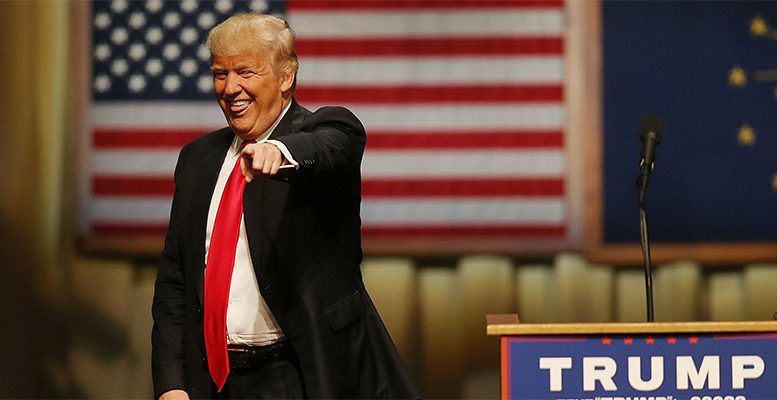Hu Shuli via Caixin | In the two and a half weeks since his inauguration, U.S. President Donald Trump has rattled the world with a series of controversial policies. By signing executive orders to withdraw from the Trans-Pacific Partnership (TPP), begin construction of the U.S.-Mexico border wall and temporarily halt all refugee admissions as well as bar visitors from seven predominantly Muslim countries, Trump has moved quickly to turn many of his campaign promises into practice, disappointing expectations that he would soften his positions on many controversial issues after taking office.
The consequences of Trump’s orders aren’t fully apparent, and the world anxiously awaits his next steps. Among many concerns is the relationship between the United States and China, especially on the business and trade fronts, and how they will be affected by Trump’s policies. These are worthy of special attention.
Trump frequently targeted China during his presidential campaign although he hasn’t taken any actual action. Some people in China are convinced that Trump will lower his belligerent tone against China to a more temperate one and not necessarily deliver the promises he made during the campaign. But the current situation has raised an alarm among those optimists as Trump has often taken tough positions and even aberrant approaches in handling political affairs while fully embracing protectionist economic policies. The established ties between China and the U.S. over the past 38 years will be tested under the Trump administration, and China should be prepared for the changes.
Vowing “America First,” Trump has pledged to make job creation and rebuilding the middle class the top priorities in the U.S. trade and economic agendas. Such an approach will bring significant changes to the country’s trade policies, shifting from the longstanding adherence to rules-based multilateralism to bilateralism.
It will still takes time to see how the Sino-U.S. trade relationship will be shaped by the Trump administration, but his top trade-official nominees, including Robert Lighthizer as the head of the Office of the U.S. Trade Representative, Peter Navarro as the head of the new National Trade Council, and Wilbur Ross as commerce secretary are sending worrisome signals because all three nominees are known for their harsh stance on Chinese trade.
To deal with Trump’s protectionist policies, one needs to understand how the sentiment behind them became so widespread. Admittedly, many ordinary Americans have been left behind in the process of globalization, which has prompted the redistribution of wealth and jobs. Their discontent and demands ought to have been expressed and answered by politicians. Ignoring these concerns created opportunities for the rise of populist, anti-establishment leaders like Trump.
The best strategy for China to fend off the impact of protectionism is to continue promoting reforms at home while further opening its economy to the outside world. In this year’s World Economic Forum, held in December in Davos, Switzerland, President Xi Jinping delivered a keynote speech to support globalization and to demonstrate China’s willingness to expand openness. In May, China will host in Beijing the “One Belt, One Road” summit, which will become another important platform for multilateral cooperation and promote the regional trade networks that are led by China.
Internal reforms are more important. China should stick to its reform agenda, unveiled at the Third Plenum of the 18th Party Congress in 2013, to make the market play the decisive role in resource allocation and promote reforms in state-owned companies, the household registration system and other key areas in order to support a successful economic transformation. China also needs to step up efforts to enhance property-rights protection, ensure fair competition and create a social environment that favors reform and opening-up while fighting anti-reform sentiment. With all these efforts, China will be able to grasp opportunities in economic integration and become an eligible torchbearer of globalization.
China should play its part in safeguarding Sino-U.S. economic ties. For instance, it should actively respond to the U.S.’ concerns over China’s steel exports and propose feasible solutions to settle the disputes. Only through dialogue and constructive exchange can both sides seek to fix their problems.
Many have expressed pessimism over the prospects of the U.S.-China Bilateral Investment Treaty (BIT), which has undergone years of negotiations. But some experts also say that Trump’s opposition to multilateral trade deals may eventually prompt a breakthrough in bilateral-trade talks, as closer economic ties with China will also benefit the U.S. in terms of exports and job creation. Undoubtedly there will be more uncertainties and challenges in future negotiations, so China must take a more-rational attitude to make clear judgment on the differences of the two sides and work out solutions that can benefit both.
The Trump administration has so far sparked a lot of controversy over its policies. The new government hasn’t fully unveiled its economic and trade policies, but an early preparation for the worst-case scenario will be much more helpful than blind optimism even though the U.S system will pose institutional constraints on the presidency.
Moving forward, the relationship between China and the U.S. will be determined by the balance of national strength and domestic development conditions. Facing shock waves sent by the Trump administration, China needs to consolidate its ongoing reform efforts and be prepared for the uncertainties to better adapt to the changing world.





